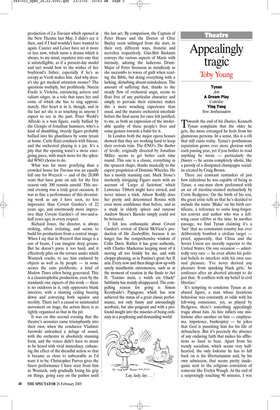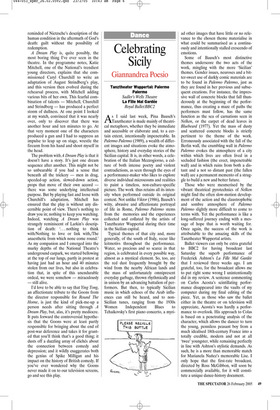Appealingly tragic
Toby Young
Tynan Arts A Dream Play Cottesloe Ying Tong New Ambassadors Towards the end of his Diaries, Kenneth Tynan complains that the older he gets, the more estranged he feels from his glamorous persona. In a sense, this is a rift that still exists today. Tynan’s posthumous reputation grows ever more glorious with each passing year, yet if you bother to read anything he wrote — particularly the Diaries — he seems completely idiotic, like a parody of a dissipated champagne socialist created by Craig Brown.
There are constant reminders of just how ridiculous he was capable of being in Tynan, a one-man show performed with an air of nicotine-stained melancholy by Corin Redgrave. On the birth of his son, the great critic tells us that he’s decided to include the name ‘Blake’ on his birth certificate, a reference to some long-forgotten convict and author who was a leftwing cause célèbre at the time. In another passage, we find Tynan claiming it’s a ‘fact’ that no communist country has ever deliberately bombed a civilian target proof, apparently, that China and the Soviet Union are morally superior to the United States. On one occasion — admittedly very rare — he even allows his political beliefs to interfere with his own sensual pleasure. ‘I’ve never derived any pleasure from spanking black girls,’ he confesses after an aborted attempt to do just that. ‘It conflicts with my belief in civil liberties.’ It’s tempting to condemn Tynan as an absurd figure, a man whose licentious behaviour was constantly at odds with his left-wing conscience, yet, as played by Redgrave, there’s something appealingly tragic about him. As fate inflicts one misfortune after another on him — emphysema, impotence, bankruptcy — he jokes that God is punishing him for his life of debauchery. But it’s precisely the absence of any enduring faith that makes his afflictions so hard to bear. Apart from his trendy socialism, which seems very halfhearted, the only lodestar he has to fall back on is his libertarianism and, by his own admission, that seems pretty inadequate next to the religious conviction of someone like Evelyn Waugh. At the end of a surprisingly touching 90 minutes, I was reminded of Nietzsche’s description of the human condition in the aftermath of God’s death: guilt without the possibility of redemption.
A Dream Play is, quite possibly, the most boring thing I’ve ever seen in the theatre. In the programme notes, Katie Mitchell, one of the National’s trendiest young directors, explains that she commissioned Caryl Churchill to write an adaptation of August Strindberg’s play, and this version then evolved during the rehearsal process, with Mitchell adding various bits of her own. This fearful combination of talents — Mitchell, Churchill and Strindberg — has produced a perfect storm of dullness. At one point I looked at my watch, convinced that it was nearly over, only to discover that there was another hour and ten minutes to go. At that very moment one of the characters produced a gun and I had to suppress an impulse to leap up on stage, wrestle the firearm from his hand and shoot myself in the head.
The problem with A Dream Play is that it doesn’t have a story. It’s just one dream sequence after another. This might not be so unbearable if you had a sense that beneath all the trickery — men in drag, speeded-up action, slowed-down action, props that move of their own accord there was some underlying intellectual purpose. But by playing fast and loose with Churchill’s adaptation, Mitchell has ensured that the play is without any discernible point of view. There’s nothing to draw you in; nothing to keep you watching. Indeed, watching A Dream Play was strangely reminiscent of Larkin’s description of death: ‘... nothing to think with/Nothing to love or link with,/The anaesthetic from which none come round.’ As my companion and I emerged into the murky depths of the National Theatre’s underground carpark, we started bellowing at the top of our lungs, partly in protest at having just had an hour and 40 minutes stolen from our lives, but also in celebration that, in spite of this unendurable ordeal, we were somehow — miraculously — still alive.
I’d love to be able to say that Ying Tong, an affectionate tribute to the Goons from the director responsible for Round The Horne, is just the kind of pick-me-up a person needs after sitting through A Dream Play, but, alas, it’s pretty mediocre. It puts forward the controversial hypothesis that the Goons were at least partly responsible for bringing about the end of post-war deference and takes it for granted that you’ll think that’s a good thing; it dusts off a dazzling array of clichés about the connection between comedy and depression; and it wildly exaggerates both the genius of Spike Milligan and his impact on the history of British comedy. If you’ve ever wondered why the Goons never made it on to our television screens, go and see this play.

















































 Previous page
Previous page